Nonprofit surveys ultimate guide (with templates)
Discover how nonprofit surveys can help positively transform an organization, streamlining donor relations, volunteer and funding management, and more.
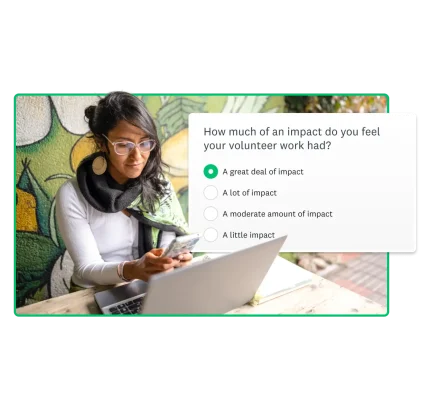
Nonprofit organizations often juggle important administrative tasks like relationship management, event planning, and maintaining internal operations. Online surveys are a cost-effective way to stay on top of these responsibilities, allowing nonprofits to focus on gauging interest in events and achieving fundraising goals.
SurveyMonkey for nonprofits offers a range of tools and templates that can help nonprofits streamline their duties, enhance donor relationships, and improve volunteer management. In this article, we’ll explore how nonprofits can leverage SurveyMonkey to create better, more successful organizations.
Is SurveyMonkey free for nonprofits?
SurveyMonkey offers a free plan to support operations and seamlessly collect feedback. The free plan offers a range of features that you can take advantage of, including:
- 10-question surveys: Create custom surveys or use a template with up to 10 questions.
- Expert templates: Leverage our years of experience by using a pre-built survey template written by one of our experts.
- Build with AI: Simply type in a prompt for a survey, and our AI tool rapidly generates a complete survey for you to use.
Nonprofit businesses can also choose to upgrade to a paid SurveyMonkey account. With this premium account, you’ll have access to our full range of features, allowing you to gain deeper insight into how your volunteers, clients, and donors feel.
SurveyMonkey discount for nonprofits
SurveyMonkey offers significant discounts to nonprofit organizations each year. Nonprofits can review the discount application to discover whether or not they’re eligible for this lower-rate SurveyMonkey account. If you meet all the requirements, you can navigate to the Plans and Pricing page and submit your discount application.
Any nonprofit organization that currently has a free plan is more than welcome to apply for our discount.
Partner with SurveyMonkey to gain exposure and get donations
Another powerful way nonprofit organizations can leverage SurveyMonkey is by signing up for our SurveyMonkey Contribute program. With Contribute, users can complete surveys and earn money for their favorite charities and nonprofit organizations.
Partnering with SurveyMonkey Contribute is a wonderful way to generate exposure for your organization while gaining donations for your nonprofit. To register for this program, your nonprofit must:
- Be registered as a nonprofit.
- Have sufficient documentation providing charitable registration.
- Not be political or religious in purpose.
- Maintain a full non-discrimination policy.
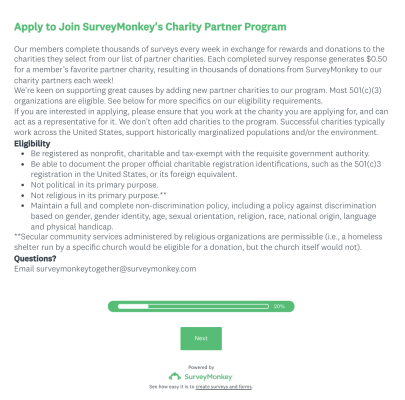
What are the best surveys for nonprofits to use
Nonprofits can use surveys to improve every part of their organization, soliciting feedback to help them create actionable steps to enhance fundraising, marketing, the employee experience, donor relationships, and more.
Let’s explore some of the best nonprofit surveys templates to use:
Fundraising and donor feedback
Fundraising and donor feedback surveys allow businesses to check in with donors and collect feedback after recent fundraising events.
Here's how to use a donor feedback survey:
- Improve donor relations: Sending out these surveys can help you collect information from donors and discover how to improve their experience with your nonprofit.
- Enhance events: Sending out this survey after an event will help identify areas you can improve on in the future.
- Scope understanding: Surveying donors can help you better understand whether your donors understand your fundraising objectives.
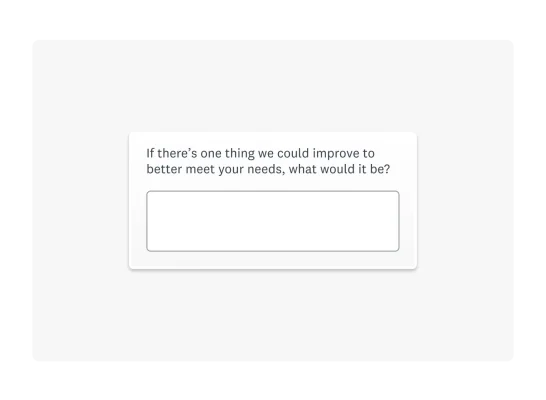
Event planning and feedback
Event planning and feedback surveys are an excellent way to understand your donors better and discover what they’re looking for in an event.
Here’s how you can use an event feedback survey template:
- Identify preferred event type: Should you be hosting galas, interactive evenings, or a different kind of event entirely? Survey your donors to discover what events they’d like to attend.
- Solicit post-event feedback: After an event, you can use these surveys to determine how successful it was and what donors would like to see improved in the future.
- Logistics planning: Iron out the finer details by launching an event planning survey, where you ask for more information, like when donors are free, how long the event should last, and other logistical details.
Improving nonprofit operations and employee experience
Nonprofits rely on networks of volunteers and employees to keep their organizations running. Requesting feedback from these groups will help you create the best possible employee experience.
Here’s how you can use employee and volunteer feedback surveys:
- Evaluate the employee experience: Surveys are one of the best ways of monitoring the employee experience and helping deliver a better workplace for your employees.
- Organize volunteer hours: Surveys make collecting data from volunteers as easy as possible. Use surveys to discover when volunteers are free for specific events.
- Build better training programs: Use these volunteer experience surveys to determine how successful volunteer training was and if you could improve your training sessions.
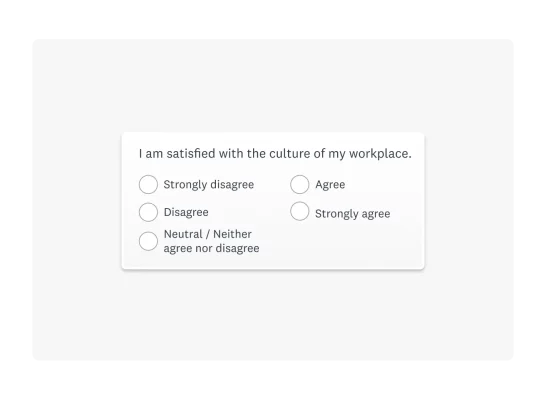
Volunteer recruiting and management
A constant influx of new volunteers will help your nonprofit manage events and build donor relationships.
Here are a few reasons you should use volunteer recruiting surveys:
- Collect applicant data: Remove data silos and collect all applications in one place for easier HR management.
- Streamline selection: Filter through survey data to identify your top candidates with minimal effort.
- Discover skills: Look for specific skills to align with future events your nonprofit organization plans to host.
Nonprofit marketing surveys
Market research surveys help nonprofits understand their wider audience and identify useful segments of donors to campaign for.
Here’s how you can use market research surveys as a nonprofit:
- Collect demographic data: Discover the core demographics of your ideal donor, helping you to create tailored campaigns to increase engagement with valuable user segments.
- Improve marketing strategies: Identify the marketing channels and methods that best resonate with your audience.
- Competitor research: Conduct competitor research to create a database of other nonprofits and catalog their marketing approaches to help inform your own and identify gaps in the market.
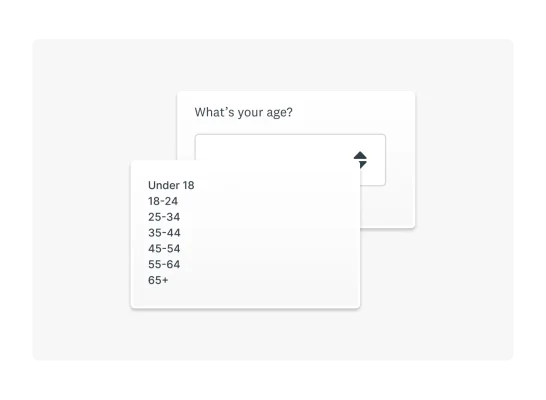
How to do market research for a nonprofit
Market research is the cornerstone of an effective nonprofit organization. When you understand the market within which you operate, you can better address your customers, motivate donors, and recruit new volunteers.
Here are some tips on how your nonprofit can conduct market research:
- Reach out to donors: Contacting one-time or past donors who have stopped contributing can help your nonprofit understand donor churn. You can prevent future churn by pinpointing why donors stop working with your business.
- Understand your target market: Use tools like SurveyMonkey Audience to understand better what makes people donate and how to approach them.
- Segment your approach: What works for one market may fall short for another. Segment your donors and use different marketing tactics to engage with them where possible. Use surveys to discover what people are looking for in your nonprofit.
- Improve your nonprofit branding: Using market research surveys, you can reach out to donors and identify ways to improve your branding to be more relatable to your target audience.
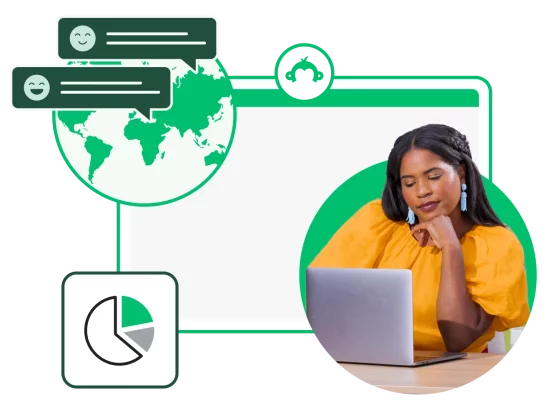
How to measure nonprofit success
Success in a nonprofit goes beyond measuring your donations over time and monitoring how well you achieve your mission. Your nonprofit can use surveys to benchmark and track key nonprofit success metrics.
For example, you can leverage the following nonprofit metrics to measure your success over time:
- Net Promoter Score® (NPS): The NPS is a general metric that suggests how loyal your donors are to your business. By measuring and benchmarking it over time, you can monitor customer loyalty and demonstrate how you’re improving your donors' experience.
- eNPS: If your employees are happy, your donors will be too. Survey your employees regularly to discover ways you could enhance their experience. You can boost employee satisfaction and drive employee loyalty by responding to their feedback.
- Donor retention rate: A low donor retention rate could suggest your message isn’t strong enough to keep donors interested over time. By measuring your donor retention rate and surveying current and past donors, you can pinpoint methods to enhance your retention rate and decrease churn.
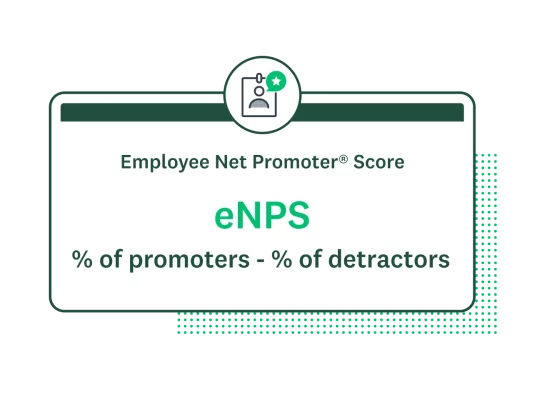
Tips for running NPO surveys
To gather responses that your nonprofit can turn into valuable insight, you must follow the best possible survey practices.
Here are some tips to run effective NPO surveys:
- Define objectives: Before sending out a survey, you should clearly understand the data you hope to gather. This focus will help improve your survey and determine the top questions to ask.
- Keep surveys short: Reduce the number of questions in your survey to ensure respondents can finish in under 5 minutes.
- Use closed-ended questions: While one or two open-ended questions are useful, most of your survey should be close-ended.
- Analyze after closure: Be sure to wait until you have received many survey responses or have closed the survey for responses before you begin to analyze your data.
Related reading: Using surveys to measure and amplify impact
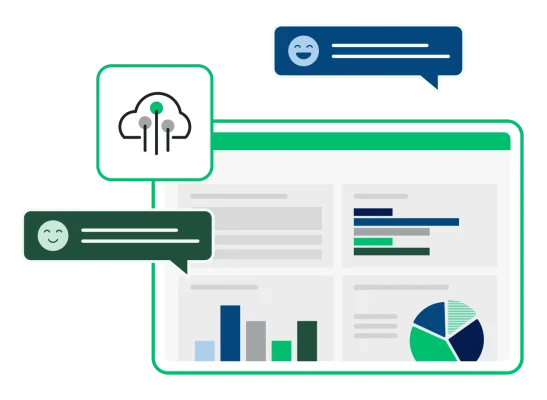
Nonprofit survey use cases
SurveyMonkey is a firm believer that nonprofits can change the world. Over recent years, we’ve had the pleasure of working with nonprofits from around the globe that are delivering a profound social impact.
Let’s explore examples of how nonprofits use surveys to enhance their organizations.
Connecting families with affordable child card
The Early Learning Coalition of Northwest Florida (ELCNWF) is a nonprofit that supports low-income families by funding childcare assistance. The organization has worked with over 3,500 families and helped over 5,000 children access education.
The ELCNWF uses surveys to streamline administrative tasks, helping with grant applications and provider feedback. As ELCNWF doesn’t have active data scientists in its organization, SurveyMonkey’s Analyze tools help them make sense of their data.
Across customer satisfaction, employee engagement, and employee satisfaction, ELCNWF uses SurveyMonkey’s features and templates to drive engagement, enhance their processes, and bring them one step closer to supporting families in need.
Testing a new nonprofit product concept
Vanguard Charitable sponsors donor-advised funds, with thousands of charitable donors in their network. After the pandemic, Vanguard wanted to survey donors to see how they would most like to allocate their giving efforts. By leveraging SurveyMonkey, Vanguard discovered that donors wanted to get hyper-local with their donations but didn’t have information on any local nonprofits to support.
The team at Vanguard began concept testing a product with SurveyMonkey Product Concept Analysis, developing the Nonprofit Aid Visualizer. After rounds of successful testing, Vanguard launched the product, allowing donors to locate local organizations that are important to them quickly.
Using SurveyMonkey, Vanguard gathered over 1,000 survey responses to their product testing, allowing the company to streamline product development and bring it to market as quickly as possible. Since its launch, the Nonprofit Aid Visualizer, in tandem with Vanguard Charitable, has generated donations that exceeded $1.5 billion in 2020.
Transform your nonprofit with SurveyMonkey
SurveyMonkey has tools and templates that allow your nonprofit to succeed. From developing new offerings to streamlining event organization, SurveyMonkey templates help your nonprofit rapidly collect and analyze data.
Nonprofits can rely on SurveyMonkey to improve all parts of their organization, from increasing donations to developing market research insights. Get started today with SurveyMonkey for nonprofits.